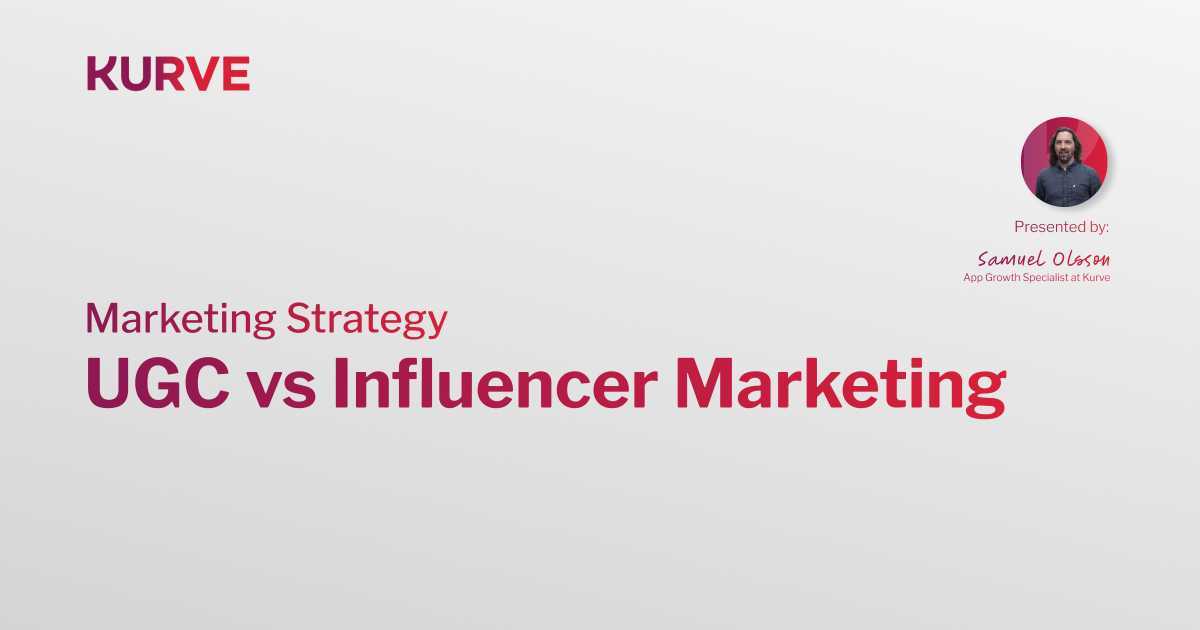Dominating the App Store: Your Guide to SEO For Mobile Apps
Every day, countless great apps are published in App Stores – and go completely overlooked, lost in the crowd of the millions of others vying for attention.
Getting noticed is an art, and it all starts with effective App Store SEO.
SEO isn't only for websites. It's a game-changer for apps, too. Proper optimization can take your app from being unnoticed to the top of search results. And the benefits? More visibility, more downloads, and more user engagement.
If you've ever wondered how some apps consistently rank high and get more downloads, you're about to uncover the secrets. At Kurve, our mission is clear: to get apps the attention they deserve. Our expert strategies have made a difference for many, and our Mobile App Marketing Services showcase how we achieve this.
This blog is your beginner's guide to App Store SEO. You'll learn the foundational steps to optimize your app, ensuring it stands out in the crowded marketplace.
| What We'll Cover: |
What is SEO for mobile applications?
Search Engine Optimization (SEO) is the tweaking and adjusting of a digital asset - a website, article, or app - so it shows up in the results when someone searches for a related time.
In mobile applications, SEO takes on a different shade. Instead of focusing purely on search engines like Google or Bing, you're optimizing for app stores - mainly the Apple App Store and Google Play Store. This specific type of SEO is often termed ASO or App Store Optimization.
A startling fact: According to a study, over 60% of apps are discovered through app store searches.
.png?width=717&height=560&name=What%20is%20SEO%20for%20mobile%20applications%20(2).png)
It means the search function in app stores is the most common method for finding and downloading new apps. If your app needs optimizing for these searches, you could miss out on downloads and users.
SEO can make or break a website's success as an ASO for mobile applications. Proper optimization ensures your app gets noticed in the crowd.
What makes SEO crucial for mobile applications?
It's undeniable that the mobile application landscape is cluttered, with millions of apps scattered across various platforms. How can yours stand out and reach its target users?
This challenge brings us to the importance of SEO for mobile applications. It's not about having a great app; it's about ensuring people can find it.
With a well-optimized app, discoverability soars, visibility intensifies, and download numbers grow. In the vast sea of applications, SEO ensures your app becomes a landmark, guiding users to it.
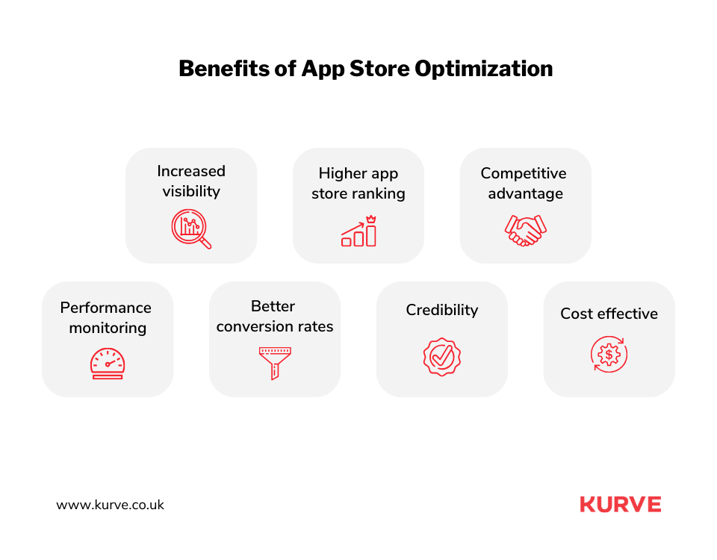
Generic Search
When discussing generic search, we discuss the broad, often non-specific queries people type into search engines.
For instance, "fitness app" or "note-taking app" are generic terms. For your mobile app to appear under such searches, it's vital to have content related to it available on the web. This could be in landing pages, blog posts, or guest articles.
By optimizing this content for SEO, your app can gain visibility when people search for generic terms. When someone looks up "best fitness apps," having content optimized for this term increases the chances of your app getting noticed and downloaded.
Organic Search
Organic search is all about unpaid search results.
These listings appear because of their relevance to the search query, not because they're promoted or sponsored. The significance of organic search lies in its credibility. Users trust organic results because they seem more genuine than paid advertisements.
For your mobile app, this means creating valuable content on your app's website or blog that resonates with potential users. When this content is SEO-optimized, it'll rank higher in search engine results for related queries. This drives traffic to your app's webpage and can lead to increased downloads due to the trust and credibility associated with organic search results.
App Store Optimization (ASO)
While SEO is a broad term encompassing a wide range of digital assets, ASO is tailored for mobile applications. It's optimizing mobile apps to rank higher in an app store's search results. Think of it as SEO but for the app store environment.
The principle is straightforward. The higher your app ranks in app store search results, the more visible it is to potential users. With ASO, factors like your app title, description, keywords, reviews, and ratings play a pivotal role.
By optimizing these elements, you improve your app's chances of appearing at the top of search results in the App Store or Google Play. As with SEO, the end goal with ASO is to drive more traffic to your app's page in the store and encourage more downloads.
How do you optimize SEO for mobile apps?
SEO for apps isn't about plugging in a few keywords. It's a multi-faceted process that touches everything from your app's title to its reviews.
Think of this section as your straightforward roadmap. SEO might seem complex, with many moving parts, but we've broken it down. You'll learn about critical areas like;
- Keyword research,
- Optimizing the primary data of your app with On-Metadata,
- The importance of elements like reviews in Off-Metadata.
Plus, we'll guide you through the tech side of things, like Listing and Localization.
Keyword Research
At the heart of any successful SEO strategy, be it for websites or mobile apps, lies keyword research. It's the complex process of understanding user intent, predicting their search queries, and aligning your app to be right there when they look.
So, how can you decode this critical aspect of optimization? Let's look at that.
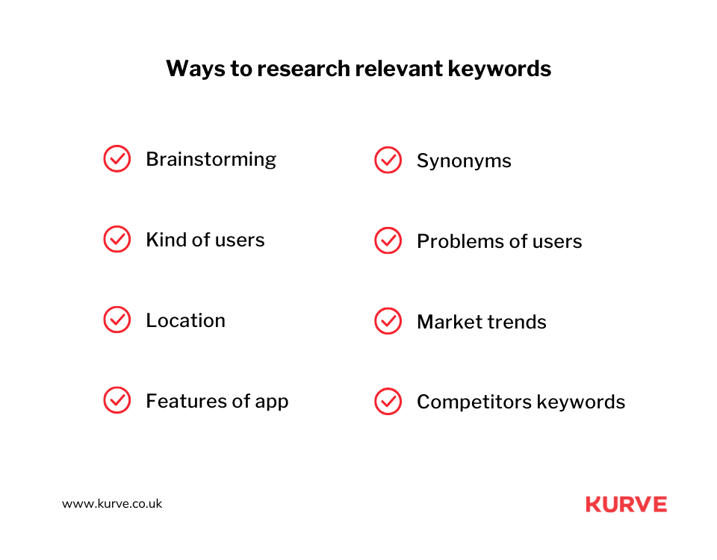
Start by figuring out the essence of your app. Understanding your app's core functionality is a foundational and continuous step. What problem does your app solve? Is it about fitness tracking, note-taking, or a unique recipe finder? This essence becomes your springboard to discover relevant keywords.
Once you're clear on that front, you can leverage the power of tools. Keyword Tools like App Annie and Sensor Tower are invaluable. When you input the foundational terms of your app into these platforms, a world of related keywords unfolds. These tools offer insights into search volumes and competitiveness, helping you to prioritize.
Now, while your app is unique, understanding the landscape is crucial. This means taking time to study competitor apps. What keywords are they championing? While it's not about imitation, competitors can illuminate gaps in your strategy or highlight emerging trends.
Amidst the vast array of keywords, there's merit in focusing on detail. Long-Tail keywords might be your treasure trove. Instead of broad terms like "fitness," something like "15-minute beginner's yoga" might resonate more with a niche audience. Such terms might be less competitive, giving you a strategic advantage.
Of course, the world of keywords isn't about collecting but curating. It's imperative to prioritize by relevance and search volume. While high search volume sounds promising, it's a double-edged sword with increased competition. Balance is key.
A crucial piece of advice? Don't sit and forget. Review and adjust your keywords. As seasons change, so do trends and user behaviors. Adaptability ensures that your app remains relevant and discoverable.
Quick Tips:
- Tailor your keywords to user intent. Relevance is paramount.
- If targeting specific regions, embrace local nuances in language and phrasing.
- Natural language trumps keyword stuffing. Always maintain clarity and coherence in your descriptions.
- Keyword research isn't a one-time task but a continual journey of aligning with user needs and industry shifts. It's about ensuring that when a potential user starts typing, your app is poised to meet them.
On-Metadata Optimization
On-metadata optimization focuses on elements within your control residing in your app's listing on various app stores.
Think of them as the framework of a house. While external factors (or off-metadata) might be the paint and decoration, the on-metadata is the foundation and structure.
It influences user perceptions and decisions when they see your app in search results. And just as a house requires a sturdy foundation to stand the test of time, your app needs solid on-metadata optimization to shine in app store search results.
Let's dig deeper into these essential elements and explore how they can be perfected.
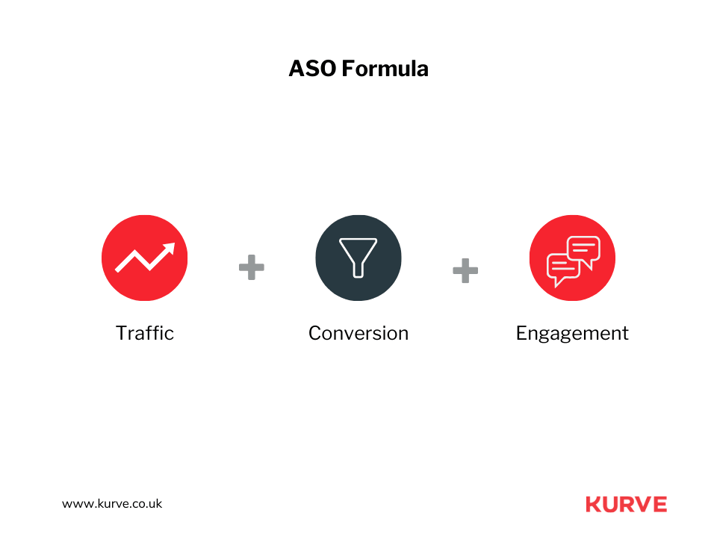
App Title
Your app's title is its first handshake with potential users. With a mere glance, it should encapsulate the essence of your app and resonate with the audience's needs. Here are some steps to craft the perfect title:
- Clarity first: Avoid jargon. Your title should offer immediate clarity about the app's purpose.
- Incorporate main keyword: Including a primary keyword not only aids in optimization but ensures users understand the app's core functionality.
- Limit character count: Both the Apple App Store and Google Play Store have character limits for titles. Ensure your title is concise while still being descriptive.
Remember, the title is your first impression; make it count.
App Description
If the title is the handshake, the app description is the following conversation. It's where you can fully communicate what your app offers, its benefits, and its unique features. Here's how to optimize it:
- Engage from the start: Begin with a compelling pitch. Address a problem and showcase how your app offers a solution.
- Prioritize information: Highlight the most critical features in the initial lines. Many users might only read up to the first few sentences.
- Include keywords naturally: While incorporating keywords is essential, ensure it flows seamlessly with the content.
- Use bullet points: For clear readability, list key features or benefits using bullet points.
Crafting an engaging description means walking the line between persuasion and information.
App URL
Though often overlooked, your app's URL (or bundle ID) can be pivotal in ASO. It's a permanent element that, once set, can't be changed without creating a new app listing. Here's what to consider:
- Keyword integration: The URL is another place where a primary keyword can be included, enhancing optimization.
- Maintain simplicity: A complex URL could be more user-friendly. Please keep it simple, clear, and easy to remember.
- Consistency with branding: Ensure your URL aligns with your app's name and branding to avoid confusion.
The URL isn't just a technical requirement; it's a piece of the optimization puzzle.
Keep Off-Metadata Updated
Stepping outside the boundaries of your direct control, off-metadata factors emerge.
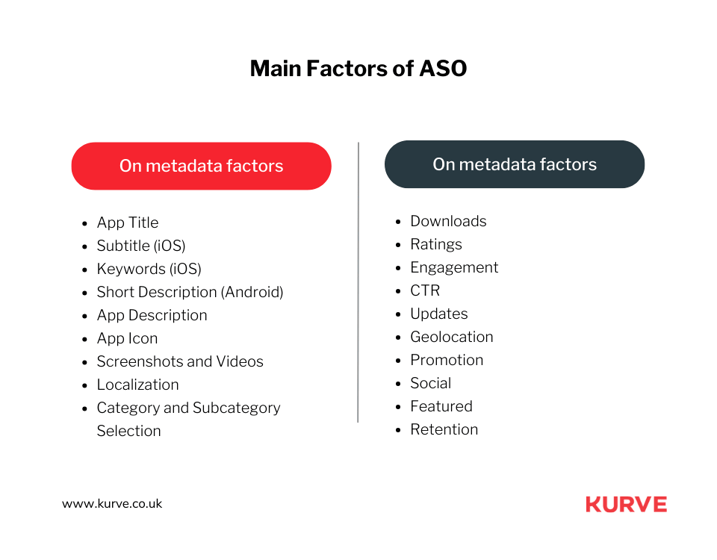
While you can't change them directly as you do with on-metadata elements, these aspects profoundly affect how users perceive and interact with your app. Think of them as word-of-mouth or third-party endorsements for physical products. They validate, authenticate, and sometimes even propel your app to greater heights.
Let's shed light on some of the most critical off-metadata components and how to ensure they remain fresh and influential.
Reviews and Ratings
Reviews and ratings are invaluable. Why? Because people trust people. They're also critical for user decisions and influence app store ranking algorithms.
When browsing, users often scroll down to see what others are saying. A stellar rating can swing decisions, while a single negative review, if not addressed, can sow doubt.
- Proactively seek feedback: After specific user milestones, like completing a level in a game or a purchase in an e-commerce app, politely prompt users for feedback.
- Engage with reviews: Address both negative and positive reviews. While appreciation can be thanked, issues should be acknowledged and solutions proposed.
- Iterate based on feedback: Don't merely collect feedback; act on it. Regular updates that address user concerns show commitment and can improve ratings over time.
Backlinks
Backlinks, predominantly for Android apps, play a role similar to how they function in website SEO. They add authority, drive traffic, and can influence app store search rankings.
- Quality over quantity - It's not just about quantity; quality matters. A link from a reputable tech blog or a news site is worth more than dozens from obscure, unrelated sites. Seek partnerships, guest post opportunities, or even sponsorships with notable names in your niche.
- Relevant content is king - If you're being linked to an article or blog post, ensure it's relevant to your app. An article on "Top Fitness Apps of 2023" linking to a meditation app might confuse search engines and users.
- Monitor your links - Be selective about online associations. Tools like Ahrefs or SEMrush can help you track your app's backlink profile, ensuring only the best associations.
While off-metadata factors might seem distant and less controllable, they're crucial in building and maintaining your app's reputation. Being proactive, attentive, and responsive ensures that these elements are potent tools propelling your app forward.
Listing, Localization, and Indexing
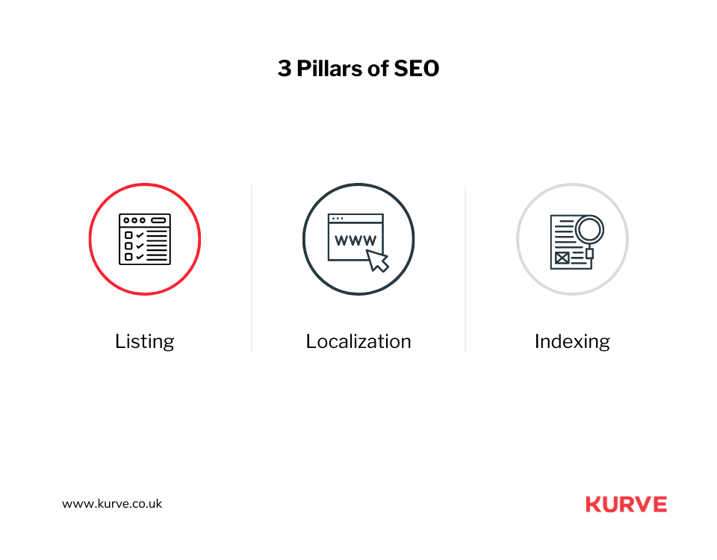
Navigating the mobile application landscape requires more than building a stellar app. It demands a thoughtful presentation, ensuring the app reaches the right audience in the most compelling and accessible manner. At this intersection, we find the principles of Listing, Localization, and Indexing.
When we talk about "Listing," we're emphasizing the importance of crafting a dedicated, welcoming space for your app in the app store. It's about presenting your app with a high-quality logo, captivating screenshots, and a description that resonates with potential users.
Imagine a user in Japan stumbling upon your app. Would they understand its features? "Localization" addresses this. It's the art and science of tailoring your app to feel native to users, irrespective of their geography. This continues beyond translating app descriptions. It's also about adjusting graphics, considering regional preferences, and ensuring every user feels at home.
Lastly, "Indexing" is your bridge to visibility. A great app is one thing, but if it's not findable, it's like a masterpiece painting locked away in an attic. By ensuring your app content aligns with search engine algorithms, you're paving the way for it to shine in relevant user searches across different platforms.
Identify Technical Issues with Site Audit
Your app's digital journey can sometimes encounter roadblocks. And just as we visit a doctor for periodic health check-ups, your app, too, requires regular examinations to ensure it's in optimal health. Welcome to the realm of site audits.
An audit dives deep, spotting red flags that might not be evident on the surface. These issues can deter users, be it technical glitches, unexpected broken links, or content that takes ages to load. Identifying them early means they can be rectified before causing more considerable hiccups.
Aside from troubleshooting, it offers insights, shedding light on areas of improvement. With this knowledge, you can tweak and refine strategies, ensuring your app remains a frontrunner.
In today's digital age, security assurance is paramount. Users need to trust your app. Potential security vulnerabilities can come to the fore through a site audit, allowing you to fortify defenses and assure users of a seamless, secure experience.
An app isn't a 'build and forget' activity. It demands continuous monitoring and evolution; these technical evaluations form the bedrock of an app's long-term success.
Make Your App Stand Out
Mobile app marketing is all about learning and adapting. It's crucial to monitor what's working and what's not, tracking your strategies, evaluating the results, and making the necessary tweaks.
We at Kurve have worked with various brands and understand the importance of adapting to change. Our Mobile Application Marketing expertise is grounded in real-world experience, ensuring that you get practical and actionable advice.
If you're thinking about refining your mobile app marketing, we're here to help. Our approach is clear-cut: use data to inform decisions and create effective strategies based on that data.
Check out Kurve's Mobile Application Marketing to see how we can support your app's growth and success.
Together, we can make sure your app stands out.


